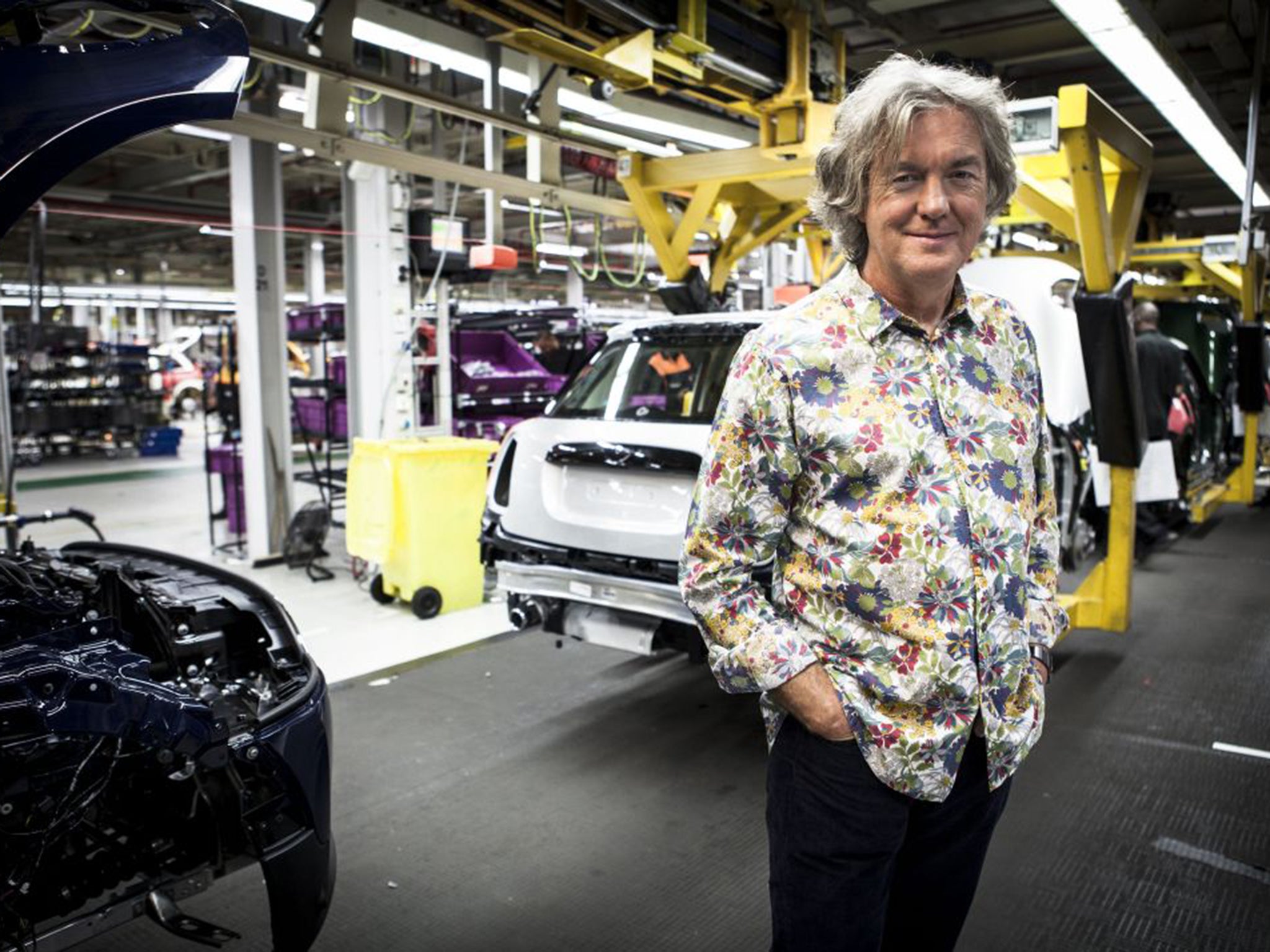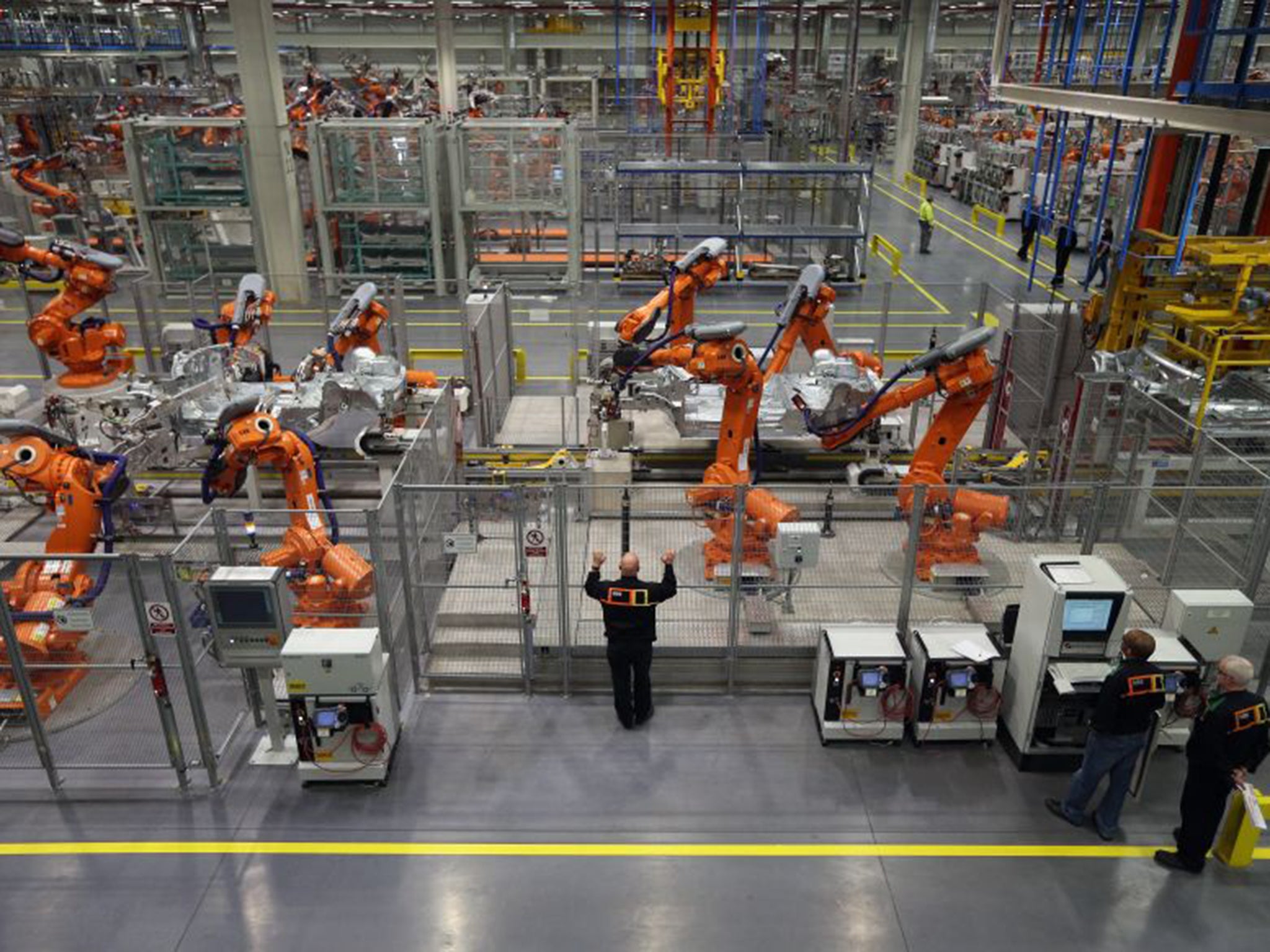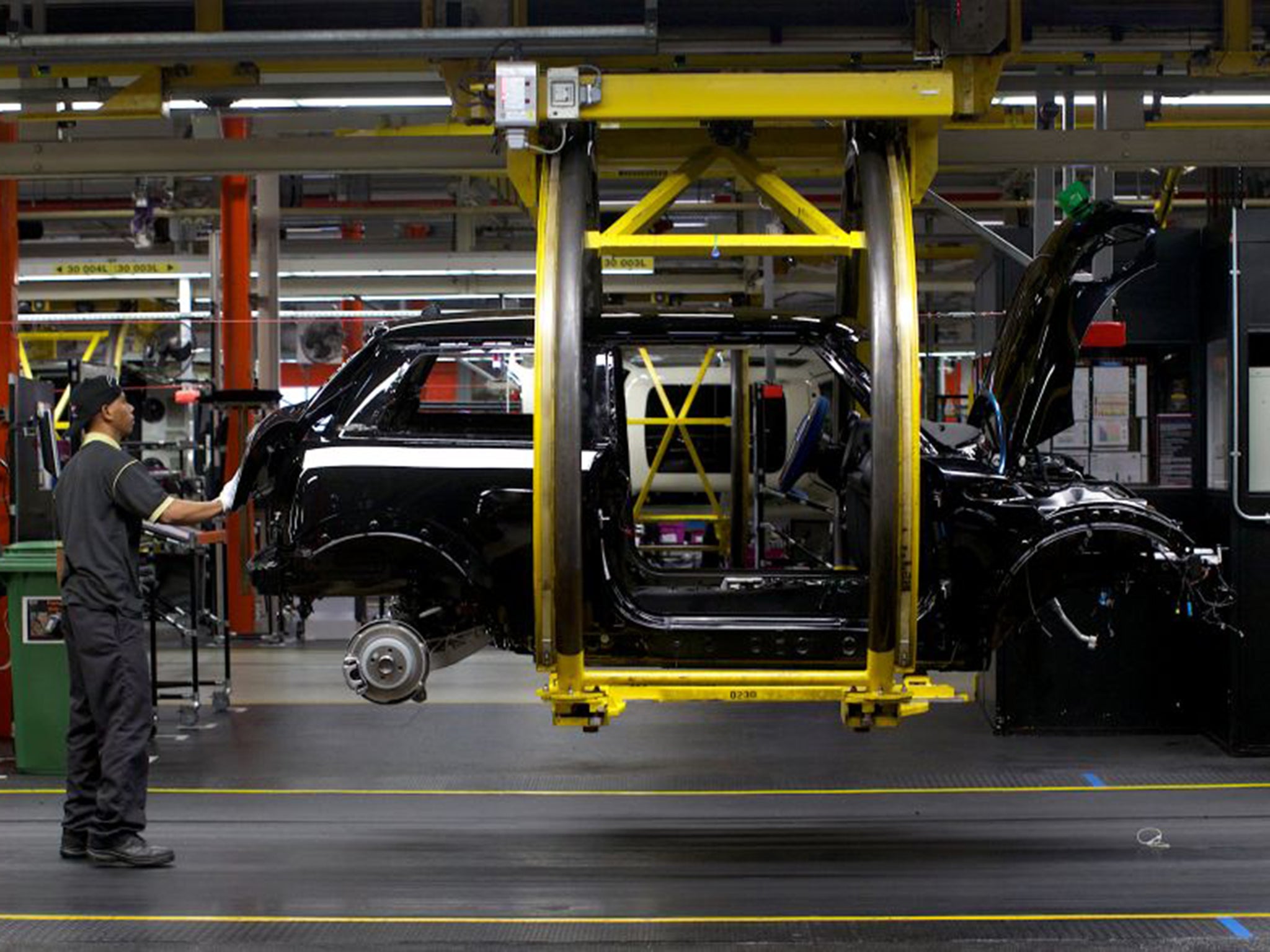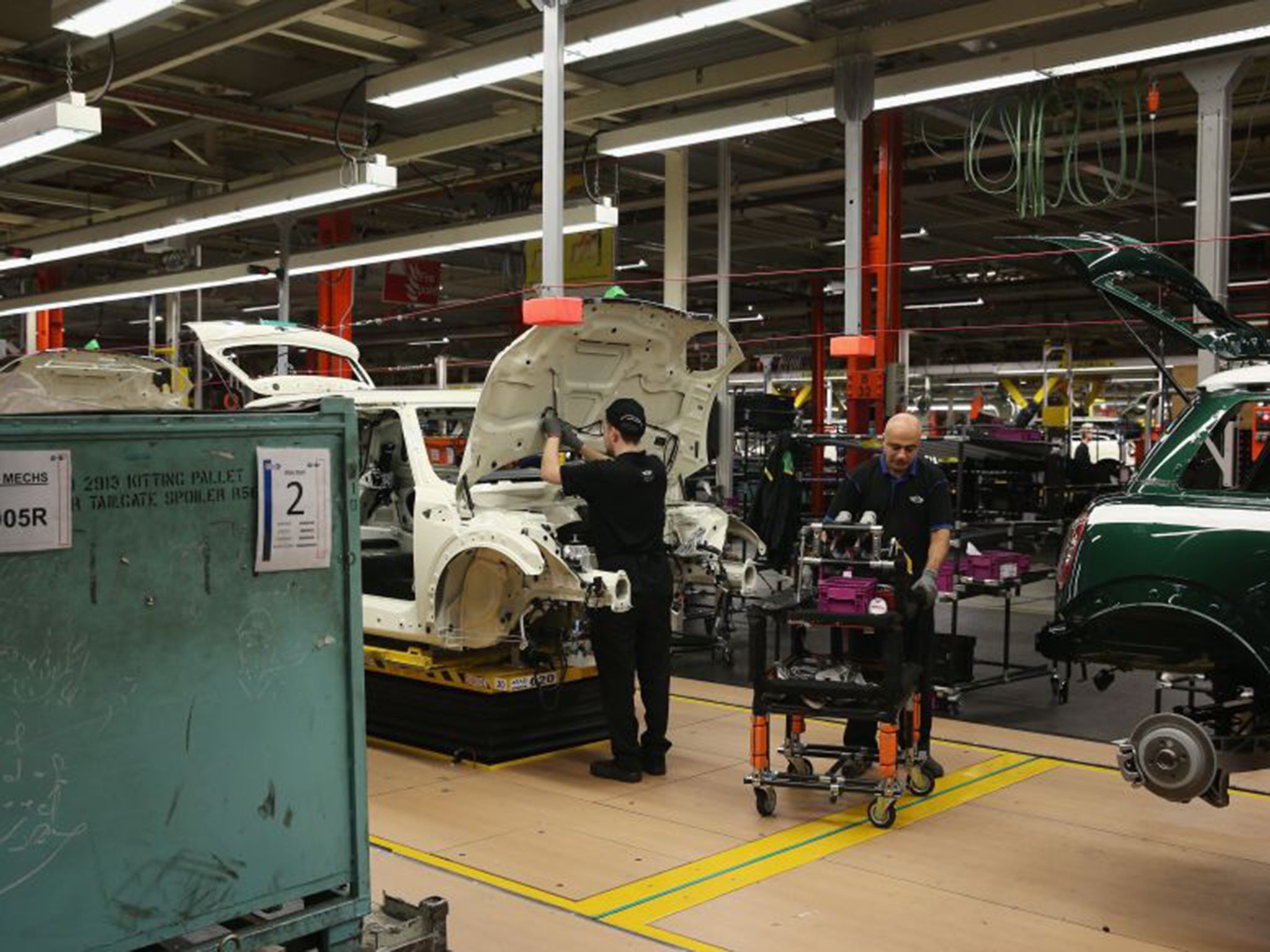James May: Former Top Gear host talks about the bright sparks of UK car-making and the fate of British steel
'Everyone likes a new car because it smells nice and is all shiny - they’ve still got the placenta on the dashboard'

‘There is absolutely nothing wrong with the British car-worker,” said James May, enthusiastically. “British car factories are fantastic.”
We were sitting inside the BMW factory at Cowley near Oxford, where they make Minis. The former Top Gear host was relaxed and happy at being inside what he clearly regarded as a spiffing bit of kit: a massive car plant where sheet metal is turned into Minis.
They take 24 hours to be “born” –as the company insists on calling it – and come off the production line at a rate of one every 68 seconds. May was very excited about this.
“Everyone likes a new car because it smells nice and is all shiny. They’re really new at the end of the production line because they’re only a minute old. They’ve still got the placenta on the dashboard …” Pardon? “Or whatever the equivalent is. Stickers.”

To say he was enthusiastic would be to say that a Ferrari can be expensive (the former Top Gear presenter has one, worth £250,000).
“I sort of think we have a moral duty to have a new car every month, because it keeps this amazing business running …” Again, pardon? A new car every month? Only a very rich man (and he is worth an estimated £13m) could contemplate such a thing, surely? “No. We’ll organise a system whereby cars are very cheap. We’ll just make simple cars. And people can enjoy their newness rather than their status or their power.”
I wish he would get on with that. Instead, May was at the factory to prepare for a two-part BBC show called Building Cars Live which went out on 20 and 21 October and followed a £30,000 Mini to the end of the line, where he drove it off with headlights flashing.
This joyous moment must have been hard to watch in one of those places where the lights are going out: Redcar, Rotherham, Clydebridge and Motherwell, places where the furnaces have burned bright for decades but are now being dimmed, as the British steel industry goes into shock and more than 5,000 people face losing their jobs.
Men and women said they were going to walk up the Eston Hills in North Yorkshire late on 24 October in the gloom, “as a show of solidarity for Teesside steel workers who have lost their jobs”.
Thousands of Middlesbrough fans say they will hold up their phones with the torches turned on 10 minutes into their game with Manchester United at Old Trafford on 28 October, as a mass demonstration of “keeping the light alive”. John Donovan, one of the organisers, said: “Steel is intrinsically built into our culture and we should never be ashamed of that.”
And yet, at the same time that as many as one in six steel workers in this country face losing their jobs, there are remarkable signs of growth in an industry which depends on steel. The industry that James May knows best.

“Thirty years ago, we exported 200,000 cars a year,” he said during Building Cars Live. “Today, we ship well over a million. Who said the British motor industry was dead?”
Lots of people, actually, but they were wrong. The Society of Motor Manufacturers and Traders says we will be making 2 million cars in this country by the end of the decade. That will break the record set in 1972, when the favourite model was a Ford Cortina. Now it’s a Ford Fiesta. See how far we have come?
What has the motor industry got right that steel-makers have got so wrong? James May was talking to me before the redundancies were announced, but he did say some things that seemed even more relevant afterwards, when I asked him how British car-building had been reborn.
“The old debate about the British car industry said, ‘Oh it was the workers, they were too militant. Oh, it was the management, they were too short-sighted. Oh, it was the economy, it was too heavily rigged.’ But today you are forced to conclude that there is absolutely nothing wrong with the British car-worker. British car factories are fantastic.”
Minis are made by BMW, which is, of course, owned by Germans. Land Rover and Jaguar are made by Tata, the same company which is having great success with cars but struggling with steel, and announced 1,200 redundancies last week.
“The factories are not owned by Britain any more, but the workforce is largely British, and the same mould of men and women who would have been working in car factories in the Seventies,” he said.
“The Nissan factory is the most efficient in Europe, so there can’t be anything wrong with that.”
May has become an expert on “how stuff gets made” – as he puts it – through his series Toy Stories, in which he built a motorcycle out of Meccano and a house out of Lego. He is also the member of the Top Gear team that people like even if they don’t like the show: the calm, collected foil to the annoyingly bouncy Richard Hammond and the simply annoying Jeremy Clarkson.
He has always seemed a bit embarrassed about the racist and sexist jokes, a bit more cultured than the other presenters (he plays the piano, loves fine wines and is married to a former dance critic) and a bit less likely to say daft things about global warming. Clarkson was sacked for punching a producer, of course, and the three of them have gone off to Amazon Prime together, but May continues to work with the BBC because he is secretly a bit of a loyalist.
“When I was a kid, the BBC was my third parent. I think that was true for a lot of people my age, which is 52. Your parents trusted the BBC and there were things on it that did form your character a bit.”
The BBC still loves him, although not all of his more boyish ideas. “One idea I have had rejected is The Pissed Olympics,” he said with a mischievous smile, rolling up the sleeves of his floral shirt then pushing back his long, floppy grey hair.
“There is always a debate about drugs. The only way to level the playing field is to say that everyone has to go into a room and drink eight cans of Special Brew, then do the pole vault and triple jump. Pissed Pole Vault. I took this idea to the BBC, and they looked at me as if I had suggested live executions on the telly or something.”
It’s hard to see why. Instead he made Building Cars Live, to show how remarkable these spotless, cutting-edge factories are.
“Most people’s idea of a car factory is based on pictures they’ve seen in an old Ladybird book, where it is a bit grubby and there are lots of things being hit with hammers by people called Bob.”
What about the Fiat advertisement in the Seventies that had an operatic soundtrack and said the cars were hand-built by robots? “Yeah. I was thinking of the Not The Nine O’Clock News sketch, where they were all hand-built by Roberts.”
In contrast to that, the modern Mini factory was an extraordinary sight. A thousand huge yellow and orange, Swedish and German robots swooped and moved like metallic velociraptors, making sparks fly.
On the production line, men and women worked together like teams of dancers, carrying out precise movements time after time. I did some of the training – fitting ridiculously fiddly switches into a circuit board – and it was impossible within the time allowed. Some of the workers at Cowley do that 300 times a shift.
Others keep their balance calmly on a moving track even as they fit panels, windows, lights or complicated electronics. It would make me sick. I can only salute them.

“There’s no shortage of innate skill within Britain to do things like make cars,” said May. “We’ve got the skills, yes, and they can be learned. People have this idea that once they have gone, they’ve gone for ever. I don’t believe that.”
Thousands of jobs have been lost in the car industry over the decades, of course. The workforce at Cowley is only a fifth of what it was. The closure of car factories across the land brought the same kind of despair that steel workers are going through now.
The point that emerged from his programme and from talking to May, who now qualifies through his programmes as a historian of the car industry, is that it had to change beyond all recognition, adopting philosophies from Germany and Japan to fit in with what has become a global machine. National boundaries dissolved.
Parts are now sent from all over the world to Cowley, and a car that is driven off the ramp on to a train and taken to a port could be shipped to Yokohama, Japan. Some of the steel that makes it come from Tata, strangely enough, and is processed in plants in South Wales. Some comes from other suppliers in mainland Europe, said a BMW spokeswoman.
Not from China, then? “No. I’m ahead of you there.”
China is the problem when it comes to steel. Once it was the solution, devouring the stuff like a metal-munching dragon when the economy was booming. Now it has slowed and China does not want imports any more. It has too much steel of its own. The state-owned manufacturers do not want to put their people out of work so they are selling their surplus steel at cheap prices. Dumping it on the international market, some say.
David Cameron has promised to block Chinese imports and help the steel-makers here, who say they are paying too much in green taxes, which puts them at a disadvantage against their rivals. But whatever the government does may be too little too late.
The steel workers who are going through such dreadful times should take the flash of the Mini’s headlights as a sign of solidarity from the workers on the production line and those who lost their jobs in the past. They should not take it as a sign that somebody knows the way out of the darkness. At the moment, it looks as if nobody does.
Join our commenting forum
Join thought-provoking conversations, follow other Independent readers and see their replies
Comments